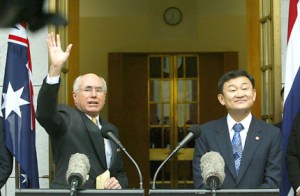Rather than only point out threats to our Democracy, a democracy which belongs to the whole electorate not just our representatives, don’t be complacent but give a hand.
This is why I am throwing a few ideas into the air to see what may come around.
- 1. Party Politics
I don’t know who first said “Politics is the major destroyer of Democracy”, but I strongly agree.
Gathering into groups of like minded individuals is a natural human trait. This can give a sense of comradeship and belonging and also increase effectiveness in achieving common goals. Hence political parties are integral to the political spectrum. However groups are subject to herd mentality or peer pressure. The constant mutual agreement and reinforcement, however can lead to dogmatism, chauvinism and exclusivism at the expense of objectivity. The major parties have, through dent of time, gained a moratorium on political participation.
The MSMs continual interpretation of difference as a weakness and a hindrance to gaining power, denies democracy a chance to flourish with in a political party by keeping ideology static and controllable. The obligation of elected members to consider the electorate before the party is diminished, democracy is compromised. With the high stakes of emcumbancy on offer, the existing duopoly is bound to restrict the entry of new parties.
Democracy needs to be dynamic, as is the Law, to maintain its eminence in a changing society. Greater flexibility would come from a wider range of political parties with a wider range of options for the electorate to identify with.
As for the claims of government stability, then the previous Government puts a lie to that claim, it was not only stable under a concerted attack but one of the most productive Governments in the history of Federation. It was a Government that required effort and discipline of effort, taking anything for granted was not an option.
The best suggestion I can offer is to have political parties register under some sort of banner, maybe demographic banner.
The senate was supposedly to be a seat of review protecting the powers of the individual State. The senate is expected to reflect the position of the state, not mirror the composition of the House of Representatives.
A better way for the Senate to represent each State would be for political parties for each State are registered in the relevant state and have no affiliation with any parties contesting the House of Representatives. As well it might be well worth considering that elections for the Senate be conducted at the same time as each State holds its own election. This would allow the Senate to better represent the current position of each State.
- 2. Parliamentary Integrity
It is encouraging to see the current Government attempt to address the issues around rorting of entitlements. After all, how long has an acceptable level of accountability been needed, 30, 40 years or even more? I would start by calling them covering expenses, this helps explain the purpose, rather than entitlement which give a greater expectation of being able to pocket the cash.
The present measures seem to be little more than a, selective, tinkering around the edges. The implementation of fines suggests a belief that some wrongful claims are made knowingly. At first this seemed a reasonable idea. However the use of punitive actions for genuine mistakes or errors could lead to a general demise in creative or lateral thinking. A loss in creativity can then act as a barrier to progressive policy development.
My suggestion is to model payment of expenses on the lines as those used by the Australian Public Service. After all, our elected representatives are there to serve, not to be served.
A second area of parliamentary integrity is the operational aspect. I am, by no means, conversant enough on the committee system within parliament to make any observations or recommendations. However I am aware of current members of Parliament who have been removed from some committees, because they expressed a disagreement with their party leader. To what degree has the committee system become a rubber stamp exercise?
The matter of Standing Orders is very much more in the public view. The manipulation of standing orders for purely political, rather than operational, purposes fuels the cynicism towards Parliament and discourages participation. It would seem that self regulation, in this instance, is counter to fostering an interest and participation in our democracy.
Suggestions for a remedy could include a standard set of standing orders with periodic review by either relevant Public Service, members of the Judiciary or by electors on a Jury based system (empower the electorate by giving greater opportunity to participate in our democracy). Such a system might also be mirrored in the position of Speaker. Once again self regulation seems to have been misused. The public face of the operation of Parliament is in dire need of a radical facelift, a cosmetic makeup does not do.
- 3. Lobbyists.
What part do lobbyists play? How beneficial is that role to the government of the nation? I can see that lobbying can be very beneficial, it is the participants in a particular industry that know best how to make it more efficient and an asset to the nation. Although the primary purpose of any industry is to the shareholders, from a Government perspective it should be primarily to the benefit of the nation. Is there a need for a specific social responsibility clause in the Corporations Law?
The very word lobby carries an implication of prejudice. To take advantage of the specialist knowledge from differing lobbying organisations, I would suggest some form of moderation in the processes available.
The only suggestion I can readily put forward would be along the lines of:
- Have lobbying organisations, or their agents registered with the relevant department.
- The department would then be responsible for arranging meetings and ensuring that any meetings include members of the Government, the Opposition and any parliamentarian who has a particular electoral interest
With a slowing mind but a quickening bladder, there are a couple of thoughts to be thrown around and/or back at me.
The Australian Independent Media Network
 Here’s a question for you. Should we bother to comment on what we read or see or hear about politics from the mainstream media? On one hand, why pay them the compliment of caring what they say? On the other, no matter how trenchant or forensic a job I might be able do on something produced by a mainstream journalist, who will it persuade? Only perhaps politically engaged followers of social media, who already agree with me. So why waste my time?
Here’s a question for you. Should we bother to comment on what we read or see or hear about politics from the mainstream media? On one hand, why pay them the compliment of caring what they say? On the other, no matter how trenchant or forensic a job I might be able do on something produced by a mainstream journalist, who will it persuade? Only perhaps politically engaged followers of social media, who already agree with me. So why waste my time?

